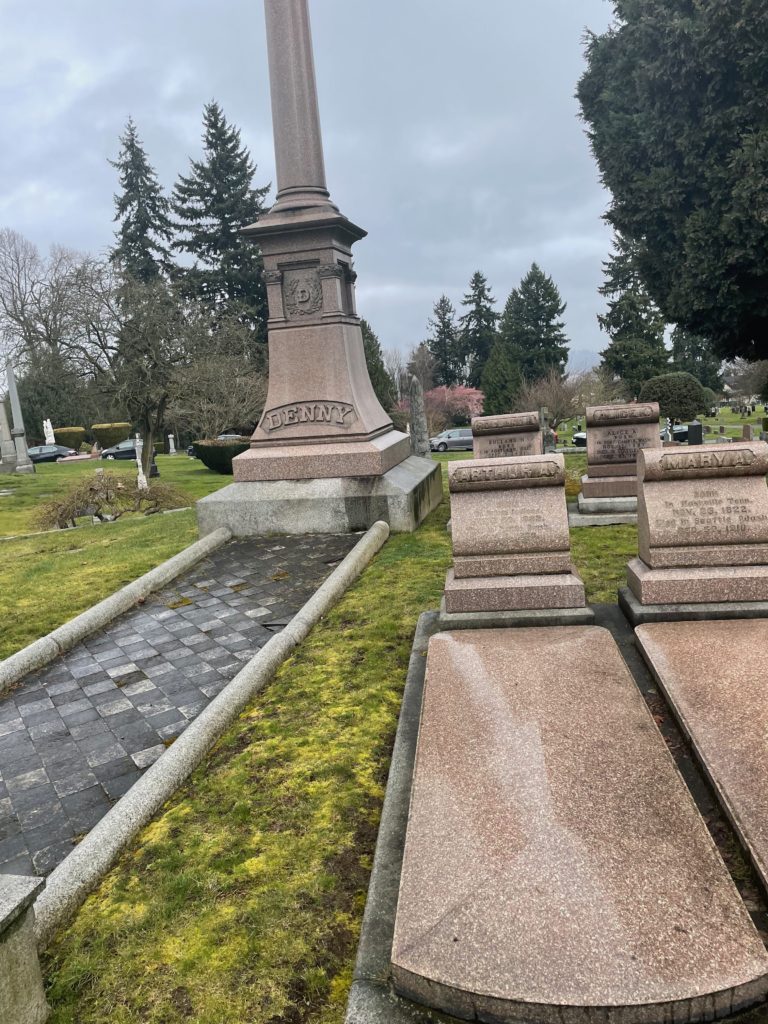Erik Visits an American Grave, Part 1,216
This is the grave of Arthur Denny.

Born in 1822 in Washington County, Indiana, Denny grew up on the frontier, with his family soon moving to Illinois. As with a lot of these families, there was this belief that something better was out there in the next place, even if it usually wasn’t. His father was a well known frontiersman type who had fought in the War of 1812 and ended up in the Illinois state legislature for a bit, which was hardly uncommon in a society where everyday folks could easily win elections like this, even if they didn’t stick around too long. Incidentally, this is part of the reason the South so effectively dominated Congress–while the North was cycling people in and out of every office up to Senate, the South elected elites who controlled power for decades.
Anyway, Arthur Denny grew up in this milieu and he had the urge to keep moving west too. He lived a pretty typical frontier lifestyle–working a lot of different jobs, living in some rough conditions, learning a lot of trades needed to survive. Eventually, he became a surveyor, which certainly was a desired profession out there. Finally, in 1851, the Dennys decided to pick up again and leave Illinois for Oregon Territory. This was Denny and his wife and kids, but also his father, brothers, and other extended family. They had a difficult trip, even though the Oregon Trail was well-established at this time. This included a skirmish with tribes along the Snake River, though it does not seem that anyone died. Rather than move south into Oregon though, where there were too many people, they headed north into what would become Washington, finally ending up at the site of modern Seattle. These first years were terrible, living in the mud and muck of the Puget Sound and trying to get along with the tribes, which they would inevitably fail out and which eventually led, not only because of the Dennys but the many others, to the genocidal wars of 1855 led by Isaac Stevens.
Denny became one of the leaders of the new place immediately, as he was one who lobbied Congress to create Washington Territory in 1852. He gladly volunteered for the genocide. But then things got complicated. He was a lieutenant but when Stevens ordered he and his men to the big battles around Snoqualmie Pass, they refused to go because it would expose the settlers on the Sound to attacks. For this, they were dishonorably discharged, but this had little impact on Denny’s later career.
He held a variety of offices in early Washington Territory, including the territory’s congressional representative to Washington from 1865-67, which he seems to have disliked. Most important, the Lincoln administration named a Denny, a good Whig turned Republican, as the head of the General Land Office in Olympia. That was a good way to consolidate wealth, even as Congress kept reducing the salary for these officials. In the end, as many of these whites discovered, there really wasn’t anywhere else to go so it was time to stick around. To the extent that Denny is famous today, it’s as the founder of Seattle. I don’t really care about that–I mean, it has to be someone but whatever. But the larger point here to me is how these generations of nineteenth century whites finally had to stop moving. The frontier never held real promise anyway; the differences between Indiana, Illinois, Oregon, and Washington weren’t really that great. There was always stories of people like Laura Ingalls Wilder, whose parents moved to horrible places in South Dakota in their search for the new, and yeah, I guess that was there, but you’d have to be more desperate than the Dennys to end up out there. Still, plenty did.
Denny spent his last decades as a rich guy, making money on land speculation, engaging in banking, and transforming himself to be a locally important Gilded Age figure. It’s his land where the University of Washington is located today. He donated it for the university. He headed a railroad and a steel company and all sorts of other things. His 1888 book Pioneer Days on the Puget Sound became a semi-classic of frontier memoirs, a largely unreadable genre but one which certainly was popular in the late nineteenth century as the frontier days gave way to nostalgia at the very time it was still happening (see the rise of the western dime novel or Buffalo Bill’s Wild West Show as more prominent examples).
To his credit, Denny supported women’s suffrage long, long before it was common and had introduced legislation to the Washington state legislature all the way back in 1854. Of course it was rejected. But still, that’s quite notable. He supported the principle for his whole life.
Denny died in 1899. He was 76 years old.
Arthur Denny is buried in Lakeview Cemetery, Seattle, Washington.
If you would like this series to visit other of these pioneer types, you can donate to cover the required expenses here. Laura Ingalls Wilder is in Mansfield, Missouri and Kit Carson is in Taos, New Mexico. Previous posts in this series are archived here.


